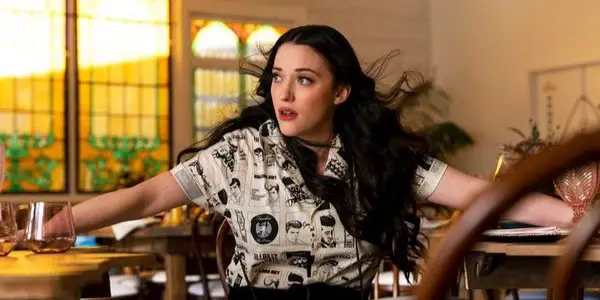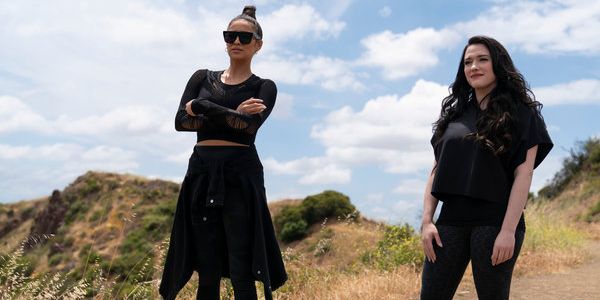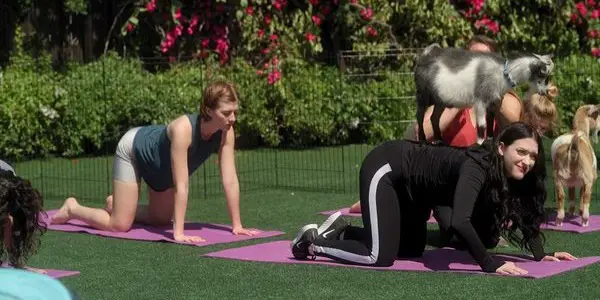DOLLFACE Season 1: The Unfruitful Collision Of Friendship & Feminism

An overwhelmed and underdressed film writer based in New York.…
Dollface should be better. The visuals and extended metaphors in each episode display the creativity of writer Jordan Weiss. With a slew of famous cameos, solid regulars, and clear on-screen chemistry of everyone involved, you’d expect a more resonant season.
As we start a new television series, we want a reason to care about these characters and invest time into these relationships. We want to relate to these people, and grow along with them. Weiss’ show leans on the knowledge of a younger audience, yet it rewards these viewers with shallow lessons and half-hearted truths.
Hulu’s new comedy follows a 20-something woman, Jules, who must reconnect with her group of girlfriends after breaking up with her long-term boyfriend. Much like the series, Jules (played by Kat Dennings) never reaches her potential, instead forming into a lead on a middle-of-the-road sitcom with all the right setup leading to a nonexistent punch line. Dollface lacks bite, conviction, and ultimately a reason to keep watching.
Some Hilarious Moments With Clever Writing
Dollface features several fantastic one-liners spoken in the flow of conversations. Combine those whip-smart phrases with a strong supporting cast and for parts of every episode, you’re engaged and chuckling.

Let’s go through some of this writing. In episode one, Jules’ best friend Madison (an extremely likable Brenda Song) sees Jules’ ex-boyfriend at this launch party, and says something to the effect of “You’re wearing a hoodie out? What are you? The founder of an Internet company?” As a reference to The Social Network and a dig at Facebook’s founder, that line made me howl.
Episode two highlights our collective love for brunch by making it into a church service, and episode three allows us to hear the line, “It tastes like Don Draper and gasoline,” while talking about a certain drink.
Margot Robbie, a producer of the show, and her huge Professor Trelawney-esque glasses dominate episode eight, an episode that also has the line, “Ruin, that could be a really pretty name for a girl.”
Outside of these quips, we see endless metaphors turned into television reality, including but not limited to emotional baggage claim, beauty pageant questions for bridesmaids, horse racing for lying about company retreats, and a courtroom procedure for being the buzz kill of the night. Some work, others don’t, but the repetition wears on you.
The show speeds through mid-20s activities and staples, highlighting SantaCon, liking old Instagram photos, group texting, and all of the elements of dating. It feigns relatability, though, as these problems have surface level solutions, linked to surface level morals.

The Root Of The Problem
Along with all the great elements of Dollface, there are an equal number of disappointments. As much as the show draws attention to its female leads, it doesn’t give them the depth they deserve. Weiss solves her characters’ problems with one swift motion, solutions that don’t break the cycle of drama or difficulty.
Dennings herself exists in a purgatory of likability, wavering from sincere and trustworthy to shallow and predictable. Her character’s friendships take precedence out of necessity, not any sort of want. She gives them the minimal amount of time and effort, with each fight spilling over onto the next episode.
The supporting actors and Jules’ friends on the show, Madison (Song), Stella (Shay Mitchell), and Izzy (Esther Povitsky), appear to be interesting people with all the trappings of incredible friends and professionals.
Madison struggles with her relationship to her older boyfriend, who ends up being married to Jules’ boss, and cannot accept that she’s been tricked. Jules helps resolve her issues with a big, season-ending wedding speech that lacks bite and originality. For all of the creativity of the show, the ending felt like a letdown.
Stella wants to be taken seriously, applying to business school and getting accepted, after first getting rejected by her school of choice. As an aside, this is also the episode Jules lies about being pregnant while trying not to be a buzzkill, yet ends with her accepting that it doesn’t matter if you’re a boring soul. Stella then goes on a drunken night of carelessness, learning that you can be fun and smart. Are these really the lessons?

Izzy goes by a different name at work, in an effort to fit in, a daily battle for many of us. In the end, she lies about the whole ordeal, another layer of supposed transformation into becoming a more whole person.
The ninth episode of the season exemplifies the show’s issues. The episode revolves around a women’s march, culminating in a famous feminist speaker. Jules and Madison fight throughout the episode, as all of the friends go through mini bouts of crisis.
They finally make it to the end of the march, missing the speaker entirely, but running into her after everything has been cleaned up. The older woman gives each of the characters a button, a little phrase that makes all of their problems sound resolved. She even says, “Looking good doesn’t mean I’m not a feminist. It just means I wake up earlier to be one.” The entire episode builds to that line and these buttons. You feel an emptiness by the end credits, a nonexistent payoff and wish that you spent your half-hour differently.
The entire series continues this pattern, with large buildups followed by a lack of resounding finalizing takeaways.
Dollface mashes together important issues, commonly held beliefs, and the problems faced by young people regardless of location. It features solid casting, fantastic moments of creativity and wit, and enough guest stars to last multiple seasons.
But that’s it. It isn’t saying anything significant. It isn’t pushing boundaries or even moving the needle in any one direction. If we’re given a second season, we all hope Dollface lives up to its potential.
What’s your favorite Hulu original comedy? Let us know in the comments below!
Dollface is currently streaming on Hulu.
Does content like this matter to you?
Become a Member and support film journalism. Unlock access to all of Film Inquiry`s great articles. Join a community of like-minded readers who are passionate about cinema - get access to our private members Network, give back to independent filmmakers, and more.
An overwhelmed and underdressed film writer based in New York. Trying to write about media from a regular, young person's point of view. Once passed John Oliver outside of a brunch spot, which is still my claim to fame.













